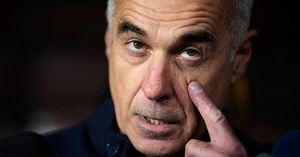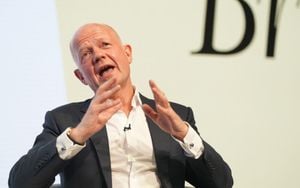Aston Martin Lagonda, the luxurious British automaker known for its iconic sports cars, is grappling with significant financial troubles, prompting urgent emergency measures. Shares of the company plummeted to their lowest point within two years following the announcement of yet another profit warning and the announcement of a hefty £210 million fundraising initiative.
Late Tuesday, Aston Martin disclosed its plan to raise funds, which will come from two main sources: £110 million from shareholders through new equity offers and the remaining £100 million via debt. This debt is accompanied by steep interest rates exceeding 10 percent, raising red flags for investors and analysts alike.
The company, which proudly carries the flag as the only listed carmaker on the London Stock Exchange, revealed its operating profits are now expected to fall between £270 million and £280 million, down from the prior estimate of £285 million. Such projections have left many scratching their heads, as they indicate both poor operational performance and production issues. Specifically, the delays concerning half of its highly anticipated £2 million Valiant supercars have contributed significantly to this financial downturn.
Shares of Aston Martin took another hit of 5.5% or 6p, dropping to 102p during early trading on Wednesday. This follows the announcement from Adrian Hallmark, who has only been at the helm of the company since September, making him the fifth CEO to navigate the tumultuous waters of this historic brand.
Upon revising the group’s financial expectations for the year just seven weeks prior, Hallmark acknowledged the challenges facing the company. He expressed the urgency to take decisive actions to stabilize operations, emphasizing the importance of establishing a balanced production and delivery profile moving forward. The CEO remains optimistic, asserting, “These efforts will deliver enhanced operational and financial performance in 2025 and beyond.”
To put things in perspective, Aston Martin has committed £2 billion for investment between 2023 and 2027, which includes plans for significantly ramping up its transition to electric vehicle production. The urgency of raising this capital has been underscored by the latest announcements from the automaker.
The new shares are set to be priced at 100p, which also reflects a 7.3 percent discount from the closing price on Tuesday evening—the market's knee-jerk reaction to this latest update. Among the new equity investors, Yew Tree Holdings, led by Lawrence Stroll, Aston Martin's chairman, has contributed approximately £50 million. Stroll’s involvement is notable as he has played a pivotal role since the group came under his control back in 2020, and the fundraising aims to secure and potentially increase his stake, which had been reduced to 26 percent from prior levels.
Notably, the equity financing has also drawn investments from various strategic partners, including the Saudi Arabia sovereign wealth fund, PIF, which had previously held 19 percent of shares; Geely, the Chinese automotive giant with 18 percent; and technology partners such as Mercedes-Benz and Lucid Motors.
The share dilution factor is another concern on the horizon, with existing shareholders who opt not to participate facing a dilution of roughly 13.5 percent. Jefferies, a renowned stockbroker, has painted quite the picture of Aston Martin's precarious situation. The analysis shows how the company’s new borrowing will push its total group debt to £1.47 billion. Meanwhile, considering cash, this results in net debt standing at £1.12 billion, which is over four times the projected operating earnings for the upcoming period.
Experts are vocal about the ramifications of this financial maneuver. Philippe Houchois, Jefferies analyst, stressed the need for Aston Martin to avoid falling victim to the dreaded “zombie balance sheet,” which would mean running low on cash reserves necessary to support its ambitious profit projection of £500 million for the following year. It’s evident, then, why the automaker is under pressure to clarify its operational strategies and timeline for the all-important electrification shift.
Against this challenging backdrop, Aston Martin is laboring to fashion its identity with future electric models to bolster sales and revive its standing as one of the premier luxury brands. The stakes couldn’t be higher as they balance modern demands with maintaining the essence of what makes Aston Martin, well, Aston Martin.
What remains unclear, though, is whether these fundraising efforts and operational recalibrations will be enough to turn the tide for Aston Martin. Only time will tell if this historic carmaker can regain its foothold and reestablish itself as a formidable player within the automotive arena.



